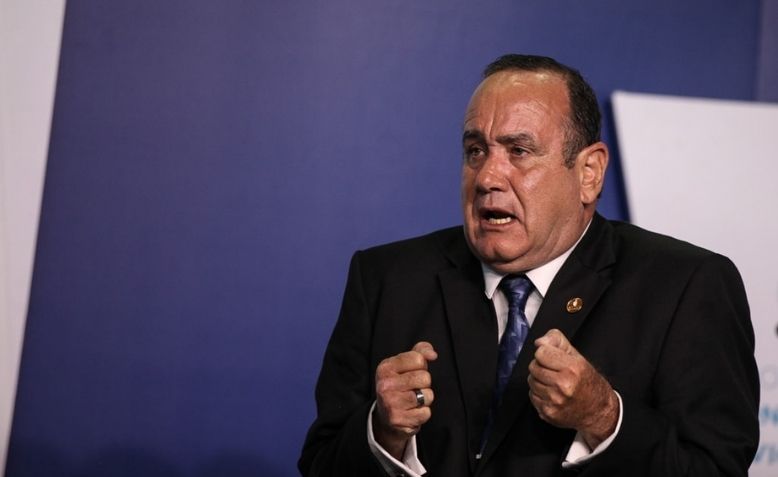 Guatemala president Alejandro Giammattei in 2019. Photo: Resumen de la investigación que enfadó a Giammattei / Wikicommons / CC BY 4.0, license linked at bottom of article
Guatemala president Alejandro Giammattei in 2019. Photo: Resumen de la investigación que enfadó a Giammattei / Wikicommons / CC BY 4.0, license linked at bottom of article
Protesters are leading a national shutdown to force President Giammattei to resign after he sacked the country’s anti-corruption prosecutor, reports Jonathan Maunders
Thousands of protesters have taken to the streets across Guatemala demanding an end to right-winger Alejandro Giammattei’s disastrous presidency.
The protests were sparked by the ousting of prosecutor, Juan Francisco Sandoval, who was leading efforts to clamp down on high-level corruption. Sandoval has since claimed that he was removed by the Attorney General to stop him from investigating corruption allegations against the president.
Indigenous leaders responded by calling for a “Paro Nacional” (nationwide shutdown), prompting various communities and social movements to unite in demanding a change in government, quickly becoming Guatemala’s largest protest in six years.
Guatemala has been beset with governmental corruption for years, causing growing anger across the country. In 2017, Giammattei’s predecessor, Jimmy Morales, labelled an UN-backed anti-corruption commission a threat to national security and barred its commissioner from entering the country.
The commission was replaced by the Special Anti-Impunity Prosecutor’s Bureau, led by Sandoval, who consistently took on powerful legislators and business leaders while in the role. Naturally, this has made him a clear target for those in the Guatemalan establishment.
Local indigenous leaders want an end to the corruption and are demanding Sandoval’s reinstatement, along with Giammattei’s resignation. They see Sandoval’s removal as the latest step in government efforts to stifle justice and equality.
While it was government corruption that eventually forced many to take to the streets, anger has been fuelled by Giammattei’s handling of the Covid-19 pandemic.
Covid-19 meets neoliberalism
Recent weeks have seen Guatemala entrenched in its worst period of the pandemic with new cases spiralling and hospitals at breaking point. This has all been exacerbated by one of the worst vaccination programmes in the whole of Latin America.
As deaths surpassed 10,000, less than 2% of the population is vaccinated. Many have linked the poor vaccination rate to further allegations of government corruption, centring on vaccine procurement.
As with many countries in the region, the Covid-19 pandemic has revealed just how frail and underfunded Guatemala’s health system is. Consecutive neoliberal governments have starved hospitals of funding and even the unprecedented spending enforced by the pandemic has failed to reach much of the health system.
In April Giammattei reached a much-heralded deal to source Russia’s Sputnik V vaccine, only for it to soon become clear that the country was not equipped with enough cold storage facilities to administer it.
Guatemala’s botched vaccine programme has also revealed significant structural inequalities. While indigenous people make up around 40% of the population, they only account for roughly 17% of vaccinations currently administered. Giammattei’s government seems intent on ignoring the plight of the country’s indigenous communities, exacerbating decades of establishment denial about the country’s imperialist legacy.
Imperialist legacy
In recent decades, human rights groups have grown across Guatemala, particularly in relation to atrocities committed during the country’s civil war (1960-1996), in which the US-sponsored successive right-wing military regimes to protect their economic interests.
While the conflict saw numerous atrocities committed against indigenous communities and left-wing activists, one of the most brutal atrocities of the war was the Ixil genocide, in which 600 villages were destroyed, decimating the Ixil Maya population.
In 1982, Ríos Montt seized power through a right-wing military coup, backed by the US, and soon initiated a ‘scorched earth’ policy against the Ixil Maya. The determination of indigenous campaigners led to Montt being convicted of genocide and crimes against humanity in 2013. However, this judgment was repealed within days.
Meanwhile, the right-wing Valor party, led by Rios’ daughter, has proposed a law that would grant an amnesty to 50 military officials convicted of human rights violations, blocking any future prosecutions.
This is why Guatemala’s indigenous communities see the government’s corruption as closely tied to the legacy of imperialist brutality.
Indeed, the fact that Joe Biden’s US administration has only paid lip service to corruption issues while they negotiate an immigration deal with Giammattei’s government suggests that legacy will continue, without a fight.
Guatemala’s national shutdown is heaping pressure on Alejandro Giammattei to resign but protesters must push on if they are to achieve the radical change they crave, reversing years of corruption and injustice.
Before you go
Counterfire is growing faster than ever before
We need to raise £20,000 as we are having to expand operations. We are moving to a bigger, better central office, upping our print run and distribution, buying a new printer, new computers and employing more staff.

